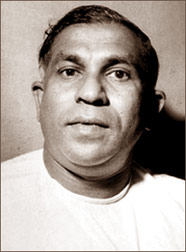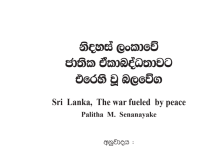A nation that commemorates its patriots is not only a ‘grateful nation’ but also a nation that rekindles its aspirations and self values set out by those pioneering icons. It is in that spirit that the Nation should commemorate Prof. F.R. Jayasuriya who did so much to so many without the slightest expectation of a return for himself.

Revolutionist
Education, they say is the ‘mother of all the revolutions’ and Prof. Jayasuriya was a revolutionist who was silent but yet effective. He was silent because his achievements were shadowed by personalities of incomparable political and national stature and he was effective because he fought successfully not only against the might of the British empire’s interest in Ceylon but also against the local leaders whose sincerity of purpose appears to be in question.
His pupils knew him as a teacher par excellence with a benign influence and in general he was known as a Professor and Head of Economics at the Kelaniya University. But the real benefactors of his dedicated life’s work are the thousands of aspiring graduates who did not know him at all.
Prof. Jayasuriya should be best remembered as the person who took up the challenge to implement the educational reforms during the transition of education from English to Swabasha. Apart from the size and scale of this transition which in itself was onerous, the fact that the reforms were opposed by the imperialist, their vested interests and shunned by many as an ‘unattainable exercise’ made the task near insurmountable. But such was the indefatigable courage and determination of this unique personality that he not only took it upon himself to accomplish the ‘impossible’ but also went that extra mile to convince the country at large the necessity of the transition.
He almost by himself authored the course material, translated the textbooks and prepared the glossaries to enable prospective Swabasha students to pursue their higher education.
Greatest gift
Starting from Economics he did this to a range of subjects including Modern Banking, International trade, Political Science, Statistics and the subject he introduced as ‘Current topics’.
Buoyed by Prof. Jayasuriya’s work, the professionals and academia in other fields of education, such as Law and Accountancy started to convert themselves into Swabasha.
Prof. Jayasuriya firmly believed in the adage that ‘the greatest gift a society can bestow on its younger generation is education’. With only six per cent of the population in Sri Lanka having any level of competency in English at the time, language was certainly standing in the way of liberalising the education. The new leaders of independent Ceylon were either reticent or reprehensive in translating the meaning of independence to the general masses.
Hence up to 1956, a near 94 per cent of the country’s population was, administered, justice dispensed and educated, (or not educated) in a language they did not understand. What was worst was that the six per cent Anglicized minority considered education to be their rightful colonial legacy. It was in this milieu that Prof. Jayasuriya took up the cause of under privileged and down trodden like a beacon of hope and inspiration.
External Degree
In addition to broad basing the University he campaigned vigorously for the introduction of External Degree examinations in the University. When his proposals did not find favour with the Educational establishment, Prof. Jayasuriya travelled from North to South to convince his case to the school principals and educational authorities and obtained 144 signatures from the school authorities to support his case. Prof. Jayasuriya believed that the job opportunities for the higher educated will look after themselves once the people are educated.
Agreed
To those who were involved in University education in the 40s, Prof. Jayasuriya’s running battles with Sir Ivor Jennings, the then imperial strong man of Sri Lankan education was almost legendary. However, there is one area in which they both agreed as reported in the biography of Sir Ivor Jennings written by HAI Gunetileke. That was in the area of the use of mother tongue in imparting education up to secondary level in Sri Lankan schools.
A scrutiny of the examination results of the Examination Department reveals that it was from the 1960s that the Advanced Level students started scoring high marks for Science and Mathematics making the University Entrance examination competitive.
This was after these subjects were being taught in the mother tongue and this is ample proof to confirm that it was only after this transition that the students started understanding these subjects in their fundamentals. Before that what the students had been learning was English, rather than Science and Mathematics in their essence.
These students who entered the universities in the 60s and 70s today form 100 per cent of the country’s mathematics and science professionals.
A large number of them went abroad, worked in the English medium, some in French, German or Japanese and obtained their post graduate qualifications. Most have become international experts/ specialists in their own fields.
English education
Acccording to Dr. Daya Rohana Athukorala, “ Students who go to non- English speaking countries such as China, Japan, Germany and France have become very conversant in those languages within a matter of few months. But what is happening in Sri Lanka is that we are in a mighty hurry to make our students very fluent in English from the Kindergarten.
As a result students don’t learn the actual subjects properly and they only learn English. And some don’t even learn that! Many organizations, especially those in the private sector, use fluency in English as the main criteria for recruitment of personnel.
Interviews are conducted in English and hence a large number of locals from rural areas are shut out of employment despite having obtained good gradings at O/L and A/L examinations”. There have also been instances where the private sector recruits telephone operators with sole emphasis on the fluency in English, only to find that the majority of the clients and staff converse in Sinhala.
Even right at this moment there is a debate going on in this country as to whether Sri Lanka should stick to Swabasha or adopt English for its future. All what Sri Lanka has to do, in search of empirical lessons, is to look for countries in Africa and Asia who opted for English in place of their mother tongue.
They are all mired in some controversy or the other. The only two exceptions are the apartheid South Africa and Singapore. In SA things are now changing and Singapore is too small a place to be called a state.
Several countries that achieved remarkable economic progress in the 80s and 90s, Japan, South Korea, Thailand, Malaysia and Taiwan, used their own native languages as the official language.
In fact the use of the native language helped these countries to tap into their vast national resources, human and otherwise, for development. We also observe that countries like Israel, Norway, Denmark, and Iceland with a population lower than that of Sri Lanka but with a very high levels of development, continue to use their native languages as the official languages in their countries.
The language issue in ex colonies like India and Sri Lanka are still mired in controversy, wedged between servitude to English and the need to realise their human potential in full. Prof Jayasuriya was a visionary who envisioned this ahead of his time and hence he fought for, and pioneered, the transition into Swabasha.
English as a skill
Further, it is not just the use of English but the way it is being used that leads progressive people in this country to question whether English is doing more harm than good to the Sri Lankan society even after 60 years of independence.
Prof Sunimal Fernando, Co-ordinator Presidential Task Force on ‘English as a life’s skill’, maintains that Sri Lanka’s colonial social elite crafted and delivered English as a hallmark of their exclusive elite status which was defined by them largely in terms of westernisation, a gateway to the west and a rejection of one’s cultural and indigenous roots.
No wonder then that the likes of Prof Jayasuriya often got branded as ‘controversial figures’ by the vestiges of English media.
It was a quirk of fate though, that brought this eminent educationist to the field of education.
Hailing from an illustrious and resourceful family in Weligama, very much elitist and English speaking, little Felix Reginald Jayasuriya showed early promise in his academic work.
After having obtained a first division pass in his London matriculation, he took up CAS and became first in Ceylon in the competitive examination.
Colonial administration
The colonial administration which had a policy of its own however, did not select young Jayasuriya to be a member of the Ceylon Administrative Service.
He then graduated from the London University with a second upper in English Honours and became a lecturer in the University of Ceylon on ‘Old and Modern English language’. He departed from University education for a brief period to serve the cause of Buddhist education as the Principal of Dharmasoka Vidyalaya, Ambalangoda, but was soon summoned to take over the Economics Department in the University of Ceylon. The galaxy of eminent personalities Prof Jayasuriya was able to mould during his 40 year illustrious career as a university don is too numerous to be mentioned.
Dr C Suriyakumaran, visiting Professor of the London School of Economics in 1984 made the following comments in the Daily News of August 3, 1984 on the passing away of Prof Jayasuriya: “He was bright, gentle and enthusiastic and firmly committed to ideals, strongly anti imperialist / anti fascist and immediately became the focus around whom students gathered readily. It was all part of an extreme goodness, and deep down, a crying concern for whatever is down.”
Elite gathering
A man who belongs to the cream of Sri Lankan society and a jewel to any elite gathering, Prof Jayasuriya did not have to be motivated by malice or insidious agendas to choose the path of the downtrodden. His vision for Sri Lanka was based on balanced thinking and benevolent patriotism and that makes him all the more worthy to be recognised.

